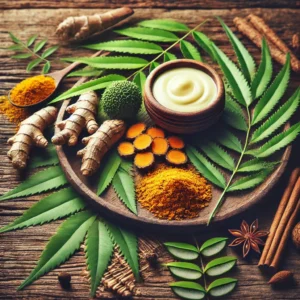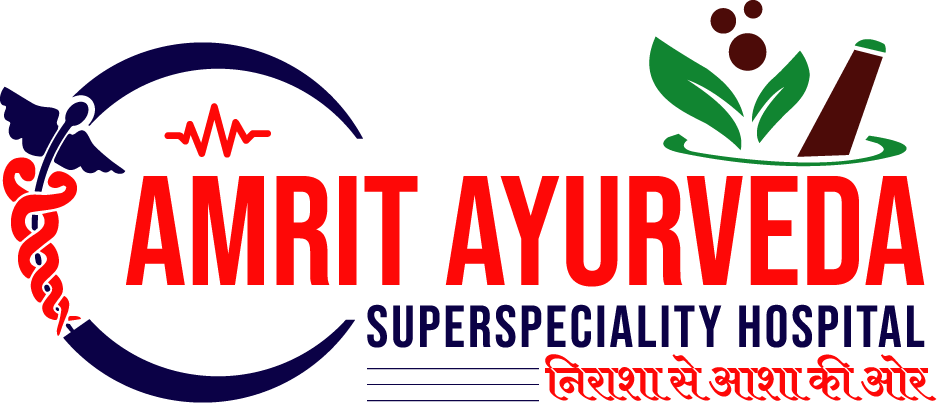How to Remove Skin Rashes with Ayurvedic Treatment: Natural Remedies
Introduction
Skin rashes are a common issue affecting people of all ages, leading to discomfort, irritation, and sometimes even pain. Whether caused by allergies, environmental factors, or underlying medical conditions, skin rashes can be a persistent problem. Many turn to natural remedies as a solution, and Ayurveda, an ancient system of holistic medicine, offers time-tested treatments for skin health.
At Amrit Ayurveda Hospital, under the guidance of Dr. Gagan Deep Sharma, Ayurvedic treatments for skin rashes are designed to target the root cause and restore balance to the body. In this blog, we will explore how Ayurvedic remedies can help you safely and effectively manage skin rashes.
What are Skin Rashes?
A skin rash is a broad term used to describe changes in the skin, including redness, irritation, swelling, and itching. Rashes can manifest in various forms, such as eczema, psoriasis, or contact dermatitis, and are often triggered by allergens, chemicals, or even stress.
Skin rashes are often a symptom of deeper issues within the body. According to medical research, around 15-20% of people will experience some form of chronic skin rash in their lifetime . While conventional treatments like steroid creams and antihistamines provide temporary relief, they may not address the underlying cause. This is where Ayurveda steps in, offering a holistic approach to treating skin disorders.
The Ayurvedic Approach to Treating Skin Rashes
Ayurveda views the skin as a mirror of internal health, closely linked to the body’s balance of doshas—Vata, Pitta, and Kapha. Skin rashes are typically related to an imbalance in the Pitta dosha, which governs heat and inflammation in the body. When Pitta is aggravated, it manifests as skin disorders, including rashes, redness, and itching.
Ayurvedic treatments aim to pacify the excess Pitta and bring the body back into balance. The holistic approach includes:
- Herbal treatments to cool and soothe the skin.
- Dietary changes to prevent further aggravation.
- Lifestyle modifications to support overall healing.
Key Ayurvedic Treatments for Skin Rashes
Ayurveda offers several natural remedies to treat skin rashes. The most commonly used treatments include:
-
Herbs:
- Neem: Known for its anti-inflammatory and antibacterial properties, neem is often used in Ayurvedic treatments for skin rashes. It helps cleanse the blood and remove toxins that contribute to skin irritations.
- Turmeric: Rich in curcumin, turmeric is a potent anti-inflammatory that reduces redness and swelling. Applying turmeric paste or consuming it with milk can offer relief.
- Aloe Vera: This cooling herb soothes inflamed skin and accelerates healing. Applying fresh aloe vera gel can help reduce the discomfort associated with rashes.

-
Oils:
- Coconut Oil: With its natural moisturizing and anti-inflammatory properties, coconut oil is an effective remedy for dry, irritated skin.
- Sandalwood Oil: This oil is known for its cooling effects, making it perfect for soothing heat-related rashes caused by Pitta imbalance.
-
Panchakarma Therapy:
- Panchakarma is a detoxification process in Ayurveda that involves five therapeutic procedures to cleanse the body. For skin rashes, Virechana (purgation therapy) is particularly beneficial, as it helps eliminate excess Pitta from the body. At Amrit Ayurveda Hospital, Dr. Gagan Deep Sharma offers customized Panchakarma therapies tailored to individual needs.
Ayurvedic Diet for Skin Health
In Ayurveda, diet plays a crucial role in maintaining skin health. Since skin rashes are often a sign of excess Pitta, a cooling and detoxifying diet is recommended to restore balance.
-
Foods to Include:
- Cooling foods such as cucumbers, aloe vera juice, coconut water, and leafy greens are excellent for soothing skin inflammations.
- Fresh fruits like pomegranates and melons can help reduce Pitta and improve skin texture.
-
Foods to Avoid:
- Spicy, fermented, and fried foods are known to aggravate Pitta and should be minimized.
- Red meat and alcohol can worsen skin conditions by heating the body and should be avoided.
Following Ayurvedic guidelines on daily routines (Dinacharya) and seasonal regimens (Ritucharya) can help prevent future outbreaks of skin rashes.
How to Use Ayurvedic Remedies for Skin Rashes at Home
While professional consultation is recommended, Some Ayurvedic remedies can be safely used at home to alleviate mild skin rashes:
- Neem and Turmeric Paste: Mix neem powder and turmeric with a little water to form a paste. Apply it to the affected area to reduce inflammation and soothe the skin.
- Aloe Vera Gel: Freshly extracted aloe vera gel can be applied directly to the rash to calm itching and promote healing.
- Sandalwood and Rosewater Pack: This mixture is effective for moisturizing the skin and reducing redness caused by heat rashes.

Benefits of Ayurvedic Treatment Over Conventional Treatments
Ayurvedic treatments for skin rashes offer several benefits over conventional methods:
- Long-Term Relief: While conventional treatments may provide quick relief, they often don’t address the root cause. Ayurveda aims to balance the body and prevent recurrence of rashes.
- Natural and Safe: Ayurvedic remedies are derived from natural herbs and oils, making them safe for long-term use without the risk of side effects that can come with steroids and other pharmaceuticals.
Studies have shown that Ayurvedic treatments like Panchakarma can significantly improve chronic skin conditions, with a success rate of over 70% in patients suffering from psoriasis .
Ayurvedic Treatment for Skin Rashes
Patients at Amrit Ayurveda Hospital have experienced significant improvement in their skin conditions through Ayurvedic treatments. One case involved a patient suffering from chronic eczema for over a decade. After following a personalized treatment plan under Dr. Gagan Deep Sharma, which included herbal treatments and detoxification, the patient saw remarkable relief and reduced flare-ups within just three months.
When to Consult an Ayurvedic Practitioner
While mild skin rashes can often be treated with home remedies, persistent or severe rashes may require professional evaluation. If you have been dealing with skin rashes that don’t respond to conventional treatments, it’s time to consult an Ayurvedic practitioner.
At Amrit Ayurveda Hospital, Dr. Gagan Deep Sharma specializes in personalized Ayurvedic treatments for skin disorders. Through a thorough assessment of your doshas and skin condition, he can develop a treatment plan that not only alleviates your symptoms but also promotes long-term skin health.
Conclusion
Ayurvedic treatments offer a holistic and natural approach to managing skin rashes. By balancing the body’s doshas and addressing the root cause of skin issues, Ayurveda provides a path to long-lasting relief. If you’re struggling with skin rashes, consider visiting Amrit Ayurveda Hospital or scheduling a consultation with Dr. Gagan Deep Sharma to explore personalized Ayurvedic solutions for your skin health.
